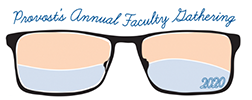Breakout:
Is Our Research Trustworthy? Building Reproducibility, Replicability, and Rigor Into Research
Time: 3 p.m. Breakout
Location: Phillips Center Lobby Atrium West
Since John Ioannidis’ 2009 landmark article, “Why Most Published Research is False,” media have been rife with stories about the untrustworthiness of research. From The Atlantic’s “Lies, Damned Lies, and Medical Science” to the New York Times’ “Psychology Itself Is Under Scrutiny,” the public is being introduced to what researchers have always known: science may not be as self-correcting as we hope. This session will present an overview of the current discussion on reproducibility, replicability, and rigor in research in all disciplines. Panelists will discuss how their own disciplines are dealing with the new emphasis on reproducibility and rigor. Panelists will describe case studies from their own experiences of working to improve their own studies’ reproducibility, replicability, and rigor. The moderator will lead a discussion with the panelists and solicit questions from the audience. The transdisciplinary nature of reproducibility will allow a robust discussion across all fields at the University of Florida.
Session type: Moderated Panel DiscussionLearning Objectives:
- Participants will understand reproducibility, replicability, and rigor and its impact on the trustworthiness of research
- Participants will understand the major barriers to reproducible, replicable, rigorous research in academia
- Participants will be introduced to interdisciplinary strategies to improve reproducibility, replicability, and rigorous research
Speakers & Panelists
Benjamin JohnsonBenjamin Johnson is an assistant professor of advertising at the University of Florida. His research is focused on why and how people select and share persuasive messages in new media settings, especially as it relates to psychological processes such as impression management, social comparison, and self-regulation. Dr. Johnson routinely shares pre-registration, data, and materials for his projects, and his interest in reproducibility has led to him to co-author an Agenda for Open Science in Communication and to plan a collaborative replication project for communication research that is launching in 2020.
Kate Ratliff
Kate Ratliff is Associate Professor in the Department of Psychology and Executive Director of the anti-bias Project Implicit. Project Implicit has educated more than 20 million visitors about implicit biases. Its vast databases are made publicly available, serving the goal of democratizing science and making research accessible. Dr. Ratliff regularly writes and speaks on openness in science, and makes her lab's data, materials, and writing publicly available. Her lab at UF developed the "Many Labs" approach to data collection in which dozens of labs worldwide work collaboratively to run the same experiment in order to ensure robust, reproducible, generalizable findings.
T. Franklin Waddell
T. Franklin Waddell is Assistant Professor in the Department of Journalism. His current research interests are at the intersection of new technology and online storytelling. Dr. Waddell teaches graduate and undergraduate classes in research methods, communication theory, and mass communication statistics. He works to educate students about reproducibility through his courses, including an Honors UnCommon Reads course on Richard Harris' "Rigor Mortis." In 2017, he was awarded for "Outstanding Service on Behalf of Graduate & Professional Students" by the University of Florida Graduate Student Council. In 2018, he was awarded the "Excellence Award for Assistant Professors" at the University of Florida.
Melissa Rethlefsen
Melissa Rethlefsen is the Associate Dean and Fackler Director, Health Science Center Libraries. Ms. Rethlefsen is a national leader on institutional support for reproducibility. Ms. Rethlefsen led efforts to create a culture of reproducibility at the University of Utah and is now leading similar efforts at the University of Florida. She is currently chairing the Research Reproducibility 2020 conference, Educating for Reproducibility: Pathways to Research Integrity, the third Research Reproducibility conference she has developed. In 2019, she was an invited speaker for the National Academies of Sciences, Engineering, and Medicine’s Enhancing Scientific Reproducibility through Transparent Reporting workshop.

